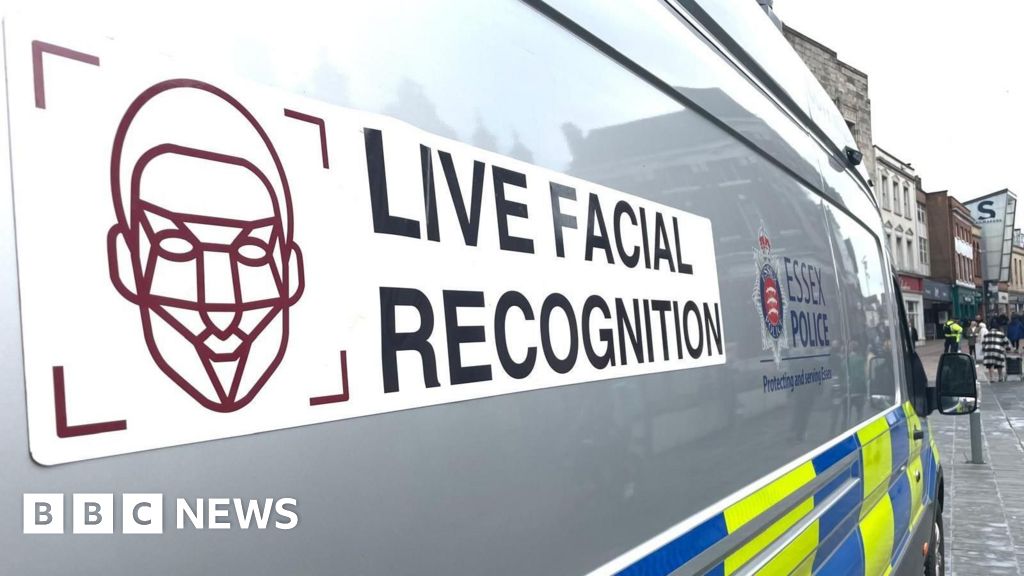Extra dwell facial recognition (LFR) vans will probably be rolled out throughout seven police forces in England to find suspects for crimes together with sexual offences, violent assaults and homicides, the Dwelling Workplace has introduced.
The forces will get entry to 10 new vans outfitted with cameras, which scan the faces of individuals strolling previous and examine them towards an inventory of wished folks.
The federal government says the expertise has been utilized in London to make 580 arrests in 12 months, together with 52 registered intercourse offenders who breached their situations.
Nevertheless, marketing campaign group Large Brother Watch mentioned the “vital growth of the surveillance state” was “alarming”.
Reside facial recognition was first utilized in England and Wales in 2017 in the course of the Uefa Champions League remaining soccer match in Cardiff.
Since then its use has largely been confined to South Wales, London and Essex together with at a Beyoncé concert to scan for paedophiles and terrorists.
The federal government is now funding 10 vans outfitted with LFR to be shared between seven forces, roughly doubling the variety of autos.
The seven forces are Better Manchester, West Yorkshire, Bedfordshire, Surrey, Sussex, Thames Valley and Hampshire.
The expertise identifies folks by taking measurements of facial options together with the gap between the eyes and the size of the jawline after which evaluating the information to to an current watchlist.
Every van will probably be staffed with a educated officer who checks the matches recognized by the expertise.
Concurrently, the federal government is holding a session on what safeguards are wanted to “guarantee transparency and public confidence”, forward of drawing up a brand new authorized framework.
Large Brother Watch is bringing a authorized problem towards the Met Police’s use of the expertise, alongside Shaun Thompson, who was wrongly identified by an LFR camera.
Rebecca Vincent, interim director of Large Brother Watch, mentioned: “Police have interpreted the absence of any legislative foundation authorising the usage of this intrusive expertise as carte blanche to proceed to roll it out unfettered, even though a vital judicial overview on the matter is pending.
“The Dwelling Workplace should scrap its plans to roll out additional dwell facial recognition capability till strong legislative safeguards are established.”
Labour peer Baroness Chakrabarti instructed the BBC the expertise was “extremely intrusive” and “some would say that is yet one more transfer in direction of a complete surveillance society”.
The previous director of human rights marketing campaign group Liberty raised issues over privateness, freedom of meeting and the potential for false matches.
Baroness Chakrabarti welcomed a session over laws to manipulate the usage of the expertise however mentioned to date it had been deployed “utterly outdoors the legislation”, with police making up their very own guidelines and marking their very own homework.
Dwelling Workplace Minister Diana Johnson rejected claims of a surveillance state, saying signposting would make it clear to the general public when the expertise was getting used and data would solely be saved for the interval of deployment.
She instructed the BBC facial recognition was “a robust device for policing” and it will solely be utilized in “a really measured, proportionate approach” to seek out people suspected of significant offences.
Nevertheless, the expertise has been used beforehand to target ticket touts in Wales, whereas a authorities supply mentioned this additionally included at latest Oasis concert events.
Johnson mentioned she didn’t know if facial recognition had been used for ticket touts.
She added that “a dialog must be had” about how the expertise is used and the federal government was consulting on this.
The federal government says officers utilizing the LFR vans might want to comply with the School of Policing’s steerage on the expertise and the Surveillance Digicam Code of Apply.
It additionally says unbiased testing of the facial recognition algorithm by the Nationwide Bodily Laboratory discovered that “the algorithm is correct and there’s no bias for ethnicity, age or gender on the settings utilized by the police”.
The Police Federation of England and Wales, which represents law enforcement officials, mentioned: “The federal government should additionally put money into complete coaching programmes for officers to accompany this expertise rollout, notably as police forces face an unprecedented officer retention disaster.”
The Dwelling Workplace has additionally introduced that it has fulfilled a manifesto pledge to make sure there’s a named, contactable officer in each neighbourhood in England and Wales.
It mentioned folks can seek for an officer on the web site of native police forces, who’ve signed as much as a dedication to reply to queries inside 72 hours.
The kind of contact technique offered will probably be as much as particular person forces.

